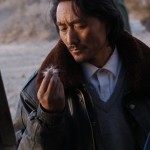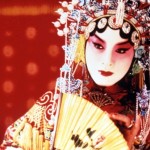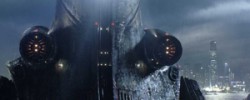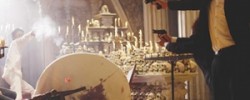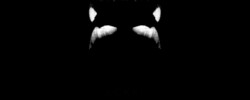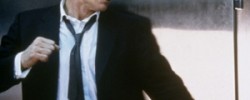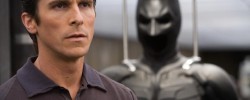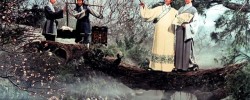
TIFF’s A Century of Chinese Cinema Review: Hero (2002)

Cast: Jet Li, Tony Leung Chiu Wai, Maggie Cheung
Director: Zhang Yimou
Country: China | Hong Kong
Genre: Action | History
Official Trailer: Here
Editor’s Notes: The following review of Hero is apart of our coverage for TIFF’s A Century of Chinese Cinema which runs from June 5th to August 11th at TIFF Bell Lightbox. For more information of this unprecedented film series visit http://tiff.net/century and follow TIFF on Twitter at @TIFF_NET.
Set in ancient China before the rule of the first emperor, where the six nations hold strong on their freedom, Hero follows the tale of one man. The man who became the hero to unify China as the great empire history books tell of. It’s hard for most to imagine mainland China as it was in medieval times, and what Hero does well as a period piece is that it develops a nuance that creates a magical sense of wonder for a time when legends seem possible. A lot of this is down to the simplicity of the mise en scene, and element that in previous Chinese films is a classic style of Chinese cinema. Director Yimou Zhang makes superb use of barren landscapes and the cinematography style that it offers. Lands of fantasy and exoticism abound, unlocking an adventure of epic proportions and mysterious grandeur.
It’s hard for most to imagine mainland China as it was in medieval times, and what Hero does well as a period piece is that it develops a nuance that creates a magical sense of wonder for a time when legends seem possible.
Jet Li takes the lead role as the eponymous title character, the anti-hero who the plot follows on his journey of remarkable talent and success. Maggie Cheung and Ziyi Zhang take central roles alongside Donnie Yen and Tony Leung Chui Wai as part of the love stories that link their characters together. The narrative unfolds as the warrior of legend is summoned before the most powerful leader Qin to tell his unbelievable tale. How is it possible that one man can bring down three assassins of preceding reputations after learning of their plans to defeat Qin, China’s most notorious warlord. As nothing noteworthy, not even holding a family name and a mere minor military official, our nameless hero has brought Qin’s three enemies to their knees, an impossible task. His accomplishment is of astonishing value to Qin’s kingdom and the retelling of his tale earns him a closer presence with Qin metre by meter as his victory unfolds. Of course not is all as it seems and tangled themes of love and loss ever prevail as each character has their fate defined by the hero’s storytelling mystique.
 The most stunning element of Hero is the use of colour. If you could filter it down to an essence, to make it easier somehow to explain why Hero is such a pivotal point in Chinese cinema, it all hinges on the colour. How colour is used, why colour is used, what colour means, it’s all exceptional. What forms the basics of theoretical film studies and critical response to a film can be seen and discussed in light of the colour in Hero. Whether colour use is read as open text in terms of narrative representation of characters and their relationships, or as a closed text in terms of gender and symbolic references, the most exciting part is the flexibility of this single element of filmmaking within Hero. Everything from the costume designs to the subtle hues in the lighting of the cinematography is essential and detailed in respect of colour. Anybody from the casual film viewer to the analytically indulgent fanatic can instantly see that the use of colour is something that seems underrepresented in other films when compared.
The most stunning element of Hero is the use of colour. If you could filter it down to an essence, to make it easier somehow to explain why Hero is such a pivotal point in Chinese cinema, it all hinges on the colour. How colour is used, why colour is used, what colour means, it’s all exceptional. What forms the basics of theoretical film studies and critical response to a film can be seen and discussed in light of the colour in Hero. Whether colour use is read as open text in terms of narrative representation of characters and their relationships, or as a closed text in terms of gender and symbolic references, the most exciting part is the flexibility of this single element of filmmaking within Hero. Everything from the costume designs to the subtle hues in the lighting of the cinematography is essential and detailed in respect of colour. Anybody from the casual film viewer to the analytically indulgent fanatic can instantly see that the use of colour is something that seems underrepresented in other films when compared.
Poetic and full of showmanship style trademarks, the movement of actors is captured on camera in such a way that you’re unlikely to forget. Hero involves some of the most splendid fight sequences made around the release date and debatably to date. What might seem ridiculous in comparison to Hollywood action sequences and fight scenes needs to be viewed in its simplicity. Yes they are flying through the air on a hefty series of wires and frameworks, but just look at them flying through the air. It’s incredibly hypnotic and before you know it you’ll barely even notice how over the top the fight sequences can get. Once you get used to powerful movements given their own camera space and the how they’re often edited into slow motion to reveal the eloquence of the martial arts, you’ll barely see it as a strange technique. One scene that stands out in its originality of context is a fight sequence that uses rainfall almost as a rhythm. In another scene, a lake is used as more than a backdrop landscape and surpasses expectations of filmic swordsmanship in one of the best wuxai genre fight scenes I’ve ever seen.
Hero involves some of the most splendid fight sequences made around the release date and debatably to date. What might seem ridiculous in comparison to Hollywood action sequences and fight scenes needs to be viewed in its simplicity.
When I first saw Hero, it was on a DVD copy loaned from a friend, via my parents TV one weekend. Never thinking too much of the story line and having not knowingly seen any Chinese cinema past Crouching Tiger, Hidden Dragon it was really just on in the background. This wasn’t long after the film made its way onto Western distribution circuits and I hadn’t heard much about it in the media. Mid essay I remember catching these amazing landscapes unlike anything I’d ever seen in feature films, the kind of natural beauty that I’d seen in geography documentaries. Needless to say that the narrative didn’t truly catch my attention for the first half of my first viewing, I was drawn into this world of ancient fighting, new wisdom and epic story telling. Unable to compare what I was seeing to the familiarity of most of the films I’d grown up watching, I remember thinking that this must be like watching a classic Disney animation for the first time as a child, I was completely spell bound and instantly enthralled. Hero has since become one of my favourite films and that’s where I began a life long fascination with Chinese cinema.
Hero will be screened at the TIFF as part of the A Century of Chinese Cinema programme under the category of Swordsmen, Gangsters and Ghosts: The Evolution of Chinese Genre Cinema. The series features eighty films, major exhibitions and special guests, running from 5th June to 11th August 2013. More information can be found at http://tiff.net/century and the full schedule will be announced on 21st May.
Related Posts
![]()
Laura Shearer
![]()
Latest posts by Laura Shearer (see all)
-
David Neary


